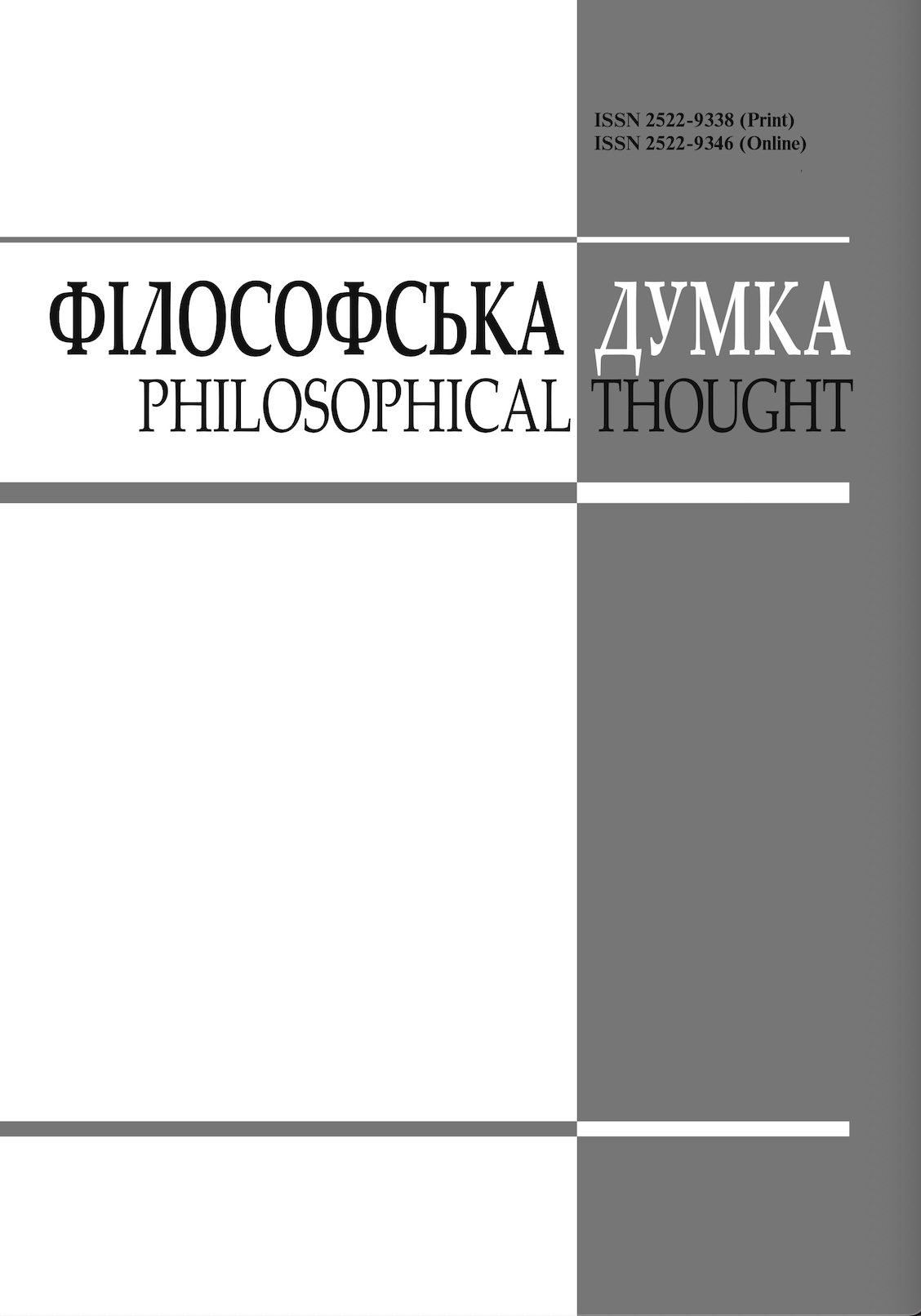NORMATIVE REASON VS. ANTHROPOLOGY: SOMETHING ABOUT KANT’S TRANSCENDENTAL SUBJECT
RETURN TO THE TOPIC: The Year of Immanuel Kant
DOI:
https://doi.org/10.15407/fd2024.03.126Keywords:
Kant, transcendental subject, transcendental unity of apperception, Self, consciousness, anthropology, anthroponomy, theoretical and practical reason, normative activity of reason, transcendental foundations of human communityAbstract
The article is devoted to the problem of the relationship between normative reason and anthropology in Kant's critical philosophy. This problem is considered in close connection with the concept of the transcendental subject, the basic concept of Kantian philosophy, as this concept applies to both theoretical and practical philosophy; this subject is also manifested in the aesthetic power of judgements and judgements of expediency. Attention is drawn to several levels of Kant's transcendental subject, where the transcendental unity of apperception, Self, is of primary importance. It is this level that Kant considered as the highest point of synthesis - both inner experience (mental) and outer experience (empirical experience) since the transcendental Self accompanies all acts of consciousness, will and power of judgement, both aesthetic and expediency judgement. In addition, other levels of transcendental subjectivity are considered, which relate to the activity of reason, especially practical reason, which is associated with the normative activity of the subject. In this context, the interaction of Kant's anthropology and its various models, with what the German philosopher defined as anthroponomy is analysed. Various aspects of this concept, its importance for the understanding of Kant's doctrine of the normative activity of reason, its ability to produce normative and legal norms of human common life, and the relationship between transcendental and anthropological aspects in this constitution are considered.
Thus, Kant's discovery of anthroponomy as one of the basic dimensions of the transcendental subject, its intersection with the anthropological characteristics of man, is a significant achievement of critical philosophy. We are only on the verge of clarifying the semantic possibilities of this extremely productive conceptual construction of the eminent German philosopher.
References
Cohen, H. (1910). Kants Begründung der Ethik, nebst ihren Anwendungen auf Recht, Religion und Geschichte. 2. verb. und erweiterte Aufl. Berlin: B. Cassirer.
Hӧsle, V. (2015). The Place of Kant's Philosophy of History in the History of the Philosophy of History. Іn: D. Engels (Hg.), Von Platon bis Fukuyama, Biologistische und zyklische Konzepte in der Geschichtsphilosophie der Antike und des Abendlandes (SS. 205-221). Bruxelles. Éditions Latomus.
Kant, I. (1911). Kritik der reinen Vernunft (B). In: Kant's gesammelte Schriften hеrausgegeben von der Königlich Preußischen Akademie der Wissenschaften (Akademie-Ausgabe, XXIX Bde). (Bd. III). Berlin: Verlag Georg Reimer.
https://doi.org/10.1515/9783112610046
Kant, I. (1911a). Kritik der reinen Vernunft (А). In: Kant's gesammelte Schriften hеrausgegeben von der Königlich Preußischen Akademie der Wissenschaften (Akademie-Ausgabe, XXIX Bde). (Bd. IV, SS. 5-252). Berlin: Verlag Georg Reimer.
Kant, I. (1911b). Grundlegung zur Metaphysik der Sitten. In: Kant's gesammelte Schriften hеrausgegeben von der Königlich Preußischen Akademie der Wissenschaften (Akademie-Ausgabe, XXIX Bde). (Bd. IV, SS. 387-463). Berlin: Verlag Georg Reimer.
Kant, I. (1914). Die Metaphysik der Sitten. In: Kant's gesammelte Schriften hеrausgegeben von der Königlich Preußischen Akademie der Wissenschaften (Akademie-Ausgabe, XXIX Bde). (Bd. VІ, SS. 205-493). Berlin: Verlag Georg Reimer.
Kant, I. (1917). Anthropologie in pragmatischer Hinsicht. In: Kant's gesammelte Schriften hеrausgegeben von der Königlich Preußischen Akademie der Wissenschaften (Akademie-Ausgabe, XXIX Bde). (Bd. VІІ, SS. 119-333). Berlin: Verlag Georg Reimer.
https://doi.org/10.1515/9783112334287
Kant, I. (1923). Zum ewigen Frieden. Ein philosophischer Entwurf. In: Kant's gesammelte Schriften hеrausgegeben von der Königlich Preußischen Akademie der Wissenschaften (Akademie-Ausgabe, XXIX Bde). (Bd. VІІІ, SS. 343-386). Berlin: Verlag Georg Reimer.
Kant, I. (1968). Metaphysik (L1), Kosmologie, Psychologie, Theologie nach Pölitz. In: Kant's gesammelte Schriften hеrausgegeben von der Königlich Preußischen Akademie der Wissenschaften (Akademie-Ausgabe, XXIX Bde). (Bd. XXVIII, SS. 193-350). Berlin: Walter de Gruyter & Co.
Kitcher, Р. (1993). Kant's Transcendental Psychology. Oxford University Press, USA.
Kitcher, Р. (2024). What is Necessary and What is Contingent in Kant's Empirical Self? Sententiae, 43(1), 8-17.
https://doi.org/10.31649/sent43.01.008
Krug, W. T. (1798). Über das Verhältniss der kritischen Philosophie zur moralischen, politischen religiösen Kultur des Menschen: zur Beantwortung der Frage: Ob man nach den Grundsätzen jener Philosophie ein guter Mensch, ein guter Bürger, und ein guter Christ seyn könne? Jena: J. G. Voigt.
Liebsch, W. (1808). Grundriß der Anthropologie: physiologisch und nach einem neuen Plane bearbeitet. Bd. 2: Anthroponomie. Göttingen: Vandenhök und Ruprecht.
Meer, R. (2022). Die Raum-und Zeitlehre Alois Riehls im Kontext realistischer Interpretationen von Kants transzendentalem Idealismus. Kant-Studien, 113(3), 459-486.
https://doi.org/10.1515/kant-2021-0031
Sussman, D.G. (2001). The Idea of Humanity: Anthropology and Anthroponomy in Kant's Ethics. New York: Taylor & Francis.
https://doi.org/10.4324/9780203820759
Wenzel, U.A. (1992). Anthroponomie: Kants Archäologie der Autonomie. Berlin: Akademie Verlag.
Downloads
-
PDF (Українська)
Downloads: 135
Published
How to Cite
Issue
Section
License
Authors who publish with this journal agree to the following terms:
- Authors retain copyright and grant the journal right of first publication.
- Authors are able to enter into separate, additional contractual arrangements for the non-exclusive distribution of the journal's published version of the work (e.g., post it to an institutional repository or publish it in a book), with an acknowledgement of its initial publication in this journal.
- Authors are permitted and encouraged to post their work online (e.g., in institutional repositories or on their website) prior to and during the submission process, as it can lead to productive exchanges, as well as earlier and greater citation of published work (See The Effect of Open Access).


